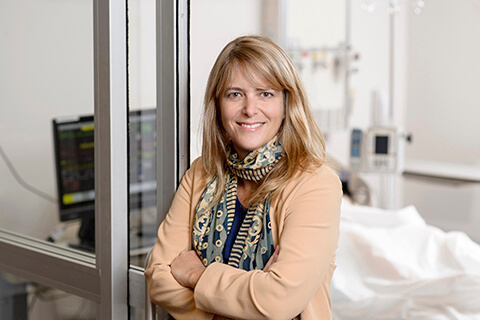January 25, 2017
Science on Tap to explore historical link during the 1970s between psychiatry, midwifery and psychedelics
 Wendy Kline
Wendy Kline
Download image
WEST LAFAYETTE, Ind. - Purdue University professor Wendy Kline, an author and expert in the histories of medicine, women's health and childbirth, will explore the unique link between psychiatry, midwifery and psychedelics during the 1970s at Thursday's session of Science on Tap.
Kline, the Dema G. Seelye Chair in the History of Medicine at Purdue, will give the talk, titled “Groovy Science: The Unexpected Entanglements of Psychiatry, Midwifery and Psychedelics,” at 6 p.m. Thursday (Jan. 26) on the top floor of Lafayette Brewing Company, 622 Main St., Lafayette. The informal lecture, sponsored by the College of Liberal Arts and the Department of History, is free and open to those 21 and older.
“The dynamic history of LSD and its overlap with the spiritually oriented home birth movement in the 1970s provides a crucial context for understanding the current state of psychedelic theory and practice,” Kline said.
In her talk, Kline will draw on records from the Maryland Psychiatric Research Center LSD Training Program Study and the papers of 1950s Czech psychiatrist and physician Stanislov Grof (from the Purdue University Archives) to explore what she describes as the “unexpected entanglements,” between psychiatry, midwifery and psychedelics.
Like many psychiatrists in Europe and the U.S. during the 1950s, Kline said, Grof was inspired by Freudian analysis. Yet he was convinced that although psychoanalysis was brilliant in theory, it was abysmal in practice and lacked visible proof of efficacy.
Over the next 15 years, Grof set out to provide that proof. Establishing himself as the world's foremost researcher of psychedelics, he conducted more than 2,000 psychedelic sessions at the Maryland Psychiatric Research Institute and the Esalen Institute in California.
Kline said Grof observed parallels between psychedelic experiences and the clinical stages of delivery, believing that the common denominator between the two was the trauma of birth. He proposed a “new cartography of the human psyche,” grounded in this observation, calling it the Basic Perinatal Matrices, or BPM.
“While developing his theory, Grof worked closely with midwives and in turn, the midwives applied his theory to the structure of out-of-hospital birth,” Kline said. “In this way, the two seemingly disparate groups - midwives and psychedelic researchers - further legitimized the scientific and spiritual components of altered states of consciousness, whether through psychedelics or giving birth.”
Kline is the author of “Bodies of Knowledge: Sexuality, Reproduction, and Women's Health in the Second Wave,” and “Building a Better Race: Gender, Sexuality, and Eugenics from the Turn of the Century to the Baby Boom.”
Science on Tap, led by graduate students Andrew Hesselbrock, Paula Cooper and Carolina Vivas Valencia, provides Purdue faculty and collaborating researchers the opportunity to share research activities in an informal setting with presentations that are designed to appeal to a more general audience. Attendance at the event has averaged 80 during the program's first five years.
Writer: Phillip Fiorini. 765-496-3133, pfiorini@purdue.edu
Sources: Wendy Kline, 765-496-2518, wkline@purdue.edu
Carolina Vivas Valencia, cvivas@purdue.edu
Paula Cooper, porourk@purdue.edu

